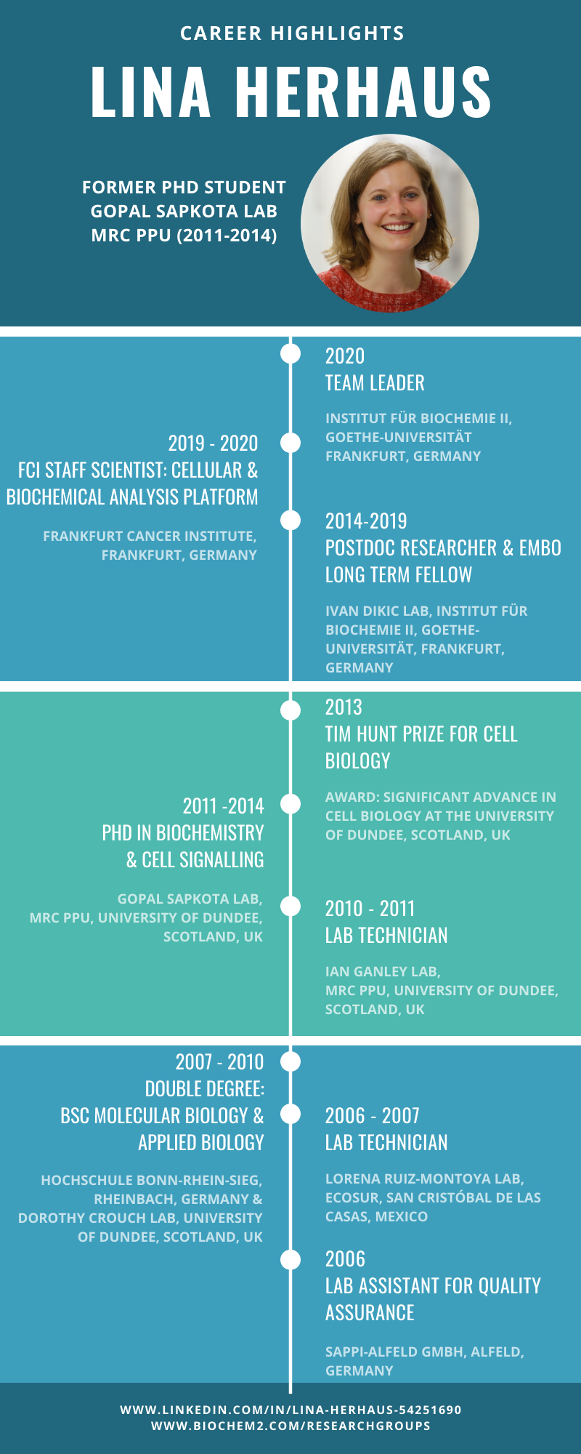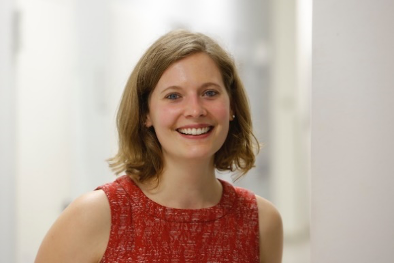 Dr Lina Herhaus - a PhD Student in Gopal Sapkota’s lab from 2011-2014 - was recently appointed as Team Leader in Immune Signalling at the Institute of Biochemistry 2, Goethe University in Frankfurt, Germany.
Dr Lina Herhaus - a PhD Student in Gopal Sapkota’s lab from 2011-2014 - was recently appointed as Team Leader in Immune Signalling at the Institute of Biochemistry 2, Goethe University in Frankfurt, Germany.
Here we catch up with Lina to discover what ignited her scientific curiosity, how her PhD Studentship at the MRC PPU has shaped her career and her current priorities as she sets up her new lab group.
Discovering a passion for lab-based science
Lina grew up in Germany and was interested in biology and languages from a young age, “I became fascinated in science when our biology teacher showed us an image depicting the cellular diversity of the human eye with explanations on how photoreceptors work.”
However, it was during her gap year in Mexico that Lina’s passion for lab-based science really developed. An internship at a plant science research centre allowed Lina to undertake both field work and lab-based research whilst immersing herself in the local culture. She discovered PCR machines and a passion for being in the lab, encouraging her to study a lab-based degree when she returned home to Germany.
The opportunity to obtain a double degree in Molecular Biology & Applied Biology from Hochschule Bonn-Rhein-Sieg, Rheinbach in Germany and The University of Dundee attracted Lina to Dundee for her final year degree exchange project and within two months of being in Dundee she applied for a PhD Studentship within the MRC PPU!
“I decided to do my final bachelor year in Dundee as part of a university exchange program. During my bachelor’s course I learned about the excellent science performed in the MRC PPU, which made me apply there for my PhD studies right away.”
Flourishing in the MRC PPU’s collaborative, experimental environment
Lina loved the research environment in the MRC PPU, as she felt supported to be creative and experimental in her PhD research whilst discovering and developing ideas for her future career.
She started her PhD in Biochemistry and Cell Signalling in October 2010 with a rotation programme that included the Ganley and Sapkota labs.
“I enjoyed both labs very much but decided to stay with Gopal Sapkota for the continuation of my PhD. Gopal is a very kind and understanding supervisor who was always able to keep up my motivation. I was given the chance to contribute to a variety of projects and I loved the diversity. We had an excellent group dynamic – the atmosphere was really supportive, I was able to rely on my colleagues (scientifically and personally) and never had the Monday morning work dread!”
Lina attributes much of the success of her PhD to the outstanding MRC PPU facilities, which enabled her to be ambitious and experimental in her approach.

“During my time in the MRC PPU I learned what is possible in science. Practically almost all biochemical techniques are possible to perform in the Unit or in collaboration with other labs in Dundee and, thanks to the support of the MRC Reagents and Services, science can have a fast pace. The MRC Reagents and Services team make and prepare so many useful research tools - including proteins, plasmids and agar plates - freeing up vital time to focus on research and be more experimental.”
This sense of community and collaboration within the Unit (with the ever popular “Friday beers”!) reaches right across the School of Life Sciences and beyond - with interconnected buildings and regular social events providing plenty of opportunity for interaction.
“Internal symposia and organised lecture series with external investigators, as well as the possibility of taking part in conferences, provided great opportunities for me to figure out what I wanted to investigate during my Postdoc and of course later with my own group.”
Growing her own lab group
Lina knew she wanted to remain in academia and further develop her research in the cell signalling pathways underpinning human disease, so she returned to Germany to undertake postdoctoral research with Professor Ivan Dikic - an expert in the fields of ubiquitin biology and autophagy research - in the Institute of Biochemistry 2 on Goethe University’s medical campus in Frankfurt.
Lina enjoys the busy, international atmosphere in the Institute and was appointed as Team Leader in Immune Signalling in May 2020. She is now focused on setting up her own group, with a PhD and a Bachelor student in the lab.
“My research experience in Dundee and Frankfurt have given me an insight into the vast spectrum of cellular signalling pathways and also allowed me to hone my skills in cutting-edge research techniques employed in biochemistry, molecular and cell biology. I am establishing my lab in the field of cell signalling and innate immunity and hope that I will be able to secure enough funding to carry out the research that I have planned.”

Lina’s experience in the supportive, collaborative environment of the Sapkota lab at the MRC PPU is driving her to create a similar environment for her group, ensuring they can work successfully as a team towards their ultimate goal of improving cancer treatments.
“In my group we aim to further understand how a myriad of signalling pathways contributes to cellular inflammation and how this influences human pathologies.”
Final thoughts
A high level of organisation has run throughout Lina’s career - applying for her PhD studentship just a couple of months into her Bachelor project, researching and applying for Postdoc roles a year before finishing her PhD and growing her own research group alongside her young family – but her advice to those looking to start a PhD studentship is to “take your career a step at a time” and to allow yourself time to develop your interests.
“Enjoy your PhD! Try to be creative and test your ideas, something great might come out! Just be aware to always include positive and negative controls, to avoid chasing ghosts.”
The Unit wishes Lina much success for the future, both with her new lab group and her growing family.
Top publications
---------------------------------
Herhaus, L., Bhaskara, R., M., Lystad, A., H., Simonsen, A., Hummer, G., Dikic, I., TBK1-mediated phosphorylation of LC3C and GABARAP-L2 controls autophagosome shedding by ATG4 protease. EMBO Reports, e48317, doi.org/10.15252/embr.201948317, (2020)
This paper reveals that TBK1 is able to phosphorylate LC3 family proteins and thereby further regulates autophagy. Phosphorylated LC3 proteins are protected by the protease ATG4 from premature removal from the autophagosome, thus promoting autophagosome maturation.
---------------------------------
Herhaus, L., Perez-Oliva, A. B., Cozza, G., Gourlay, R., Weidlich, S., Campbell, D. G., Pinna, L. A., Sapkota, G. P. 2015. Casein kinase 2 (CK2) phosphorylates the deubiquitylase OTUB1 at Ser16 to trigger its nuclear localization. Science Signalling, 8, 372, (2015)
This paper resulted as the second big project of my PhD and it solved the scientific question how a mostly cytosolic enzyme can fulfil its function during DNA damage in the nucleus.
---------------------------------
Herhaus, L., Al-Salihi, M.A., Macartney, T., Weidlich, S., Sapkota, G.P. OTUB1 enhances TGFβ signalling by inhibiting the ubiquitylation and degradation of active SMAD2/3. Nature Communications, (2013)
This was my first “first author”-paper and the basis for my PhD thesis, which makes it very special to me. In this manuscript we were able to show that OTUB1 plays an important function in TGFβ signalling via its non-canonical function of inhibiting E2 enzymes. Moreover, we were able to show that this regulation is signal-induced and only active SMADs are targeted by OTUB1.
---------------------------------
Interview date: November 2020
Written by: Sarah Patrick, Freelance Communications & Public Engagement Consultant

